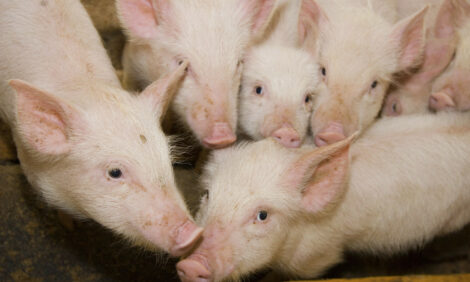



Market Preview: Pork-Related GIPSA Rules in Limbo
US - In this week's "Market Preview" from National Hog Farmer magazine, Steve Meyer comments on the latest news regarding the status of the USDA's GIPSA rule.There was finally some news last week on the status of the rule that USDA's Grain Inspection and Packers and Stockyards (GIPSA) proposed back in June 2010. It appears that the most onerous of those proposals, at least for the pork and beef industries, are being put in a holding pattern. Some observers think the hold may be very long. Here is what we know of the current status.
A final rule has been sent to the Office of Management and Budget (OMB) regarding four of the five topics for which GIPSA was required to write rules by the 2008 Farm Bill. The four areas deal with timely delivery of birds to contract growers, criteria under which requirements of additional capital investments will be in violation of the Packers and Stockyards Act (PSA), required allowances for contractors to remedy a breach of contract, and conditions for including mandatory arbitration clauses and opt-out procedures. OMB will review the rules over the next 45 days. When they are done, the rules will go into force 60 days later.
All of these topics are aimed at problems in poultry contracts. We know of few instances where hog contractors and contract growers have had any significant disputes over these topics. The hog contracting system is built on long-term relationships that have generally adapted easily to change.
But these rules now apply to hog contractor-grower relationships. Whatever the final rule says will also apply to the pork industry, and if the final rule looks like the proposed rule, there are some potential landmines, particularly in the area of additional capital investments. Recall that the threshold dollar level in this particular rule was $25,000 and that there is no guidance for differentiating maintenance/repair costs from additional capital investments.
The fifth farm bill requirement dealt with defining unfair practices and undue preferences, behaviors clearly prohibited by the PSA, but never clearly delineated. GIPSA has postponed action on this topic, but it is a major concern to everyone, including the pork industry.
This is the section of the rules that would prohibit any "unjustified" price differentials without saying what might or might not be justified. It also would require significant recordkeeping on the part of buyers and would require any premiums for quality, time, production methods, etc., to be non-discriminatory and disclosed to all when disclosed to any. There is no final rule or interim final rule on these topics, but they are not dead, either. It's just another source of uncertainty in a risky world.
An interim final rule will be published regarding the tournament system of contract payments, which bases individual growers' payments on their performance relative to other growers. It is widely used in the poultry industry, but I am not aware of any hog production contracts that use tournament rankings to determine payments.
Interestingly, GIPSA claims that the rules that it has submitted to OMB would have an impact of $70 million on the affected industries. That is below the $100-million threshold for a "major rule" that requires a cost-benefit analysis. So the strategy appears to be to divide the original proposed rule into parts small enough that any part will stay under the threshold. I don't know if that will fly in Washington, but it certainly does not pass the smell test in the countryside.
Informa Economics estimated that the total one-time cost of the rule for the beef, pork and poultry sectors was $136 million. Annual direct costs were estimated to be $165 million. Annual indirect costs, which include inefficiencies caused by less effective animal and product flows, amounted to $1.456 billion.
A USDA source told me last summer that the USDA cost-benefit analysis, which was done after the fact and under pressure from Congress, producers and processors, estimated negative economic impacts "a lot like the Informa numbers." Both Informa and USDA will admit that estimating the impact of a regulation with so many contingencies is very difficult.
The remainder of the proposed rule is apparently on hold; not dead but not moving forward at this time. In addition to the unfair practices/undue preference features discussed above, the "in limbo" parts include the limitations on contract lengths if capital investments are required, submission of marketing and production contracts to USDA, publication of contracts on USDA's website, prohibitions on packers buying animals from other packers and on dealers buying for more than one packer and redefining "competitive injury."
Also on hold – to me, the most egregious portion of the proposed rule – is the feature that said that an action did not have to injure competition in order to violate the PSA. My disdain for this feature is not the idea itself, but rather the fact that nine US Federal Circuit Courts of Appeals have held that protecting competition is the central purpose of the PSA and the fact that both houses of Congress decided not to include such a provision in the 2008 Farm Bill. Whether one agrees with those actions or not, I hope we can all agree that appointed bureaucrats should not be writing rules with the force of law that advance an idea that both the legislative and judicial branches have rejected.
What now?
It doesn't appear that anyone knows for sure the status of the "suspended" portions. They still constitute proposed rules upon which comments have been received. But last week's actions suggest that GIPSA may not be crazy about a further fight.
My real question is this: "Can a 90-year old law that was written vaguely to begin with and has been amended piecemeal so many times really be very useful in today's marketplace?" I know it is risky, but maybe we need to go back to the drawing board and craft something that makes sense for today.








